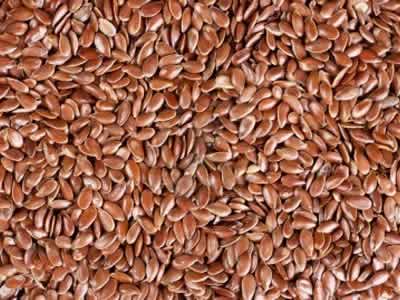Many scientific studies show that flax seed may help treat heart / cardiovascular disease and high blood pressure.
Flax seeds have been a food and fiber crop for 6000 years. The seeds have an earthy aroma and a lot of health benefiting properties. Flaxseed is an outstanding source of healthy fat, antioxidants, and fiber. The seed contains high levels of dietary fiber, lignans (an abundance of micronutrients) and omega-3 fatty acids.
Amount Per 100 grams of flax seeds contains the following nutrition facts:
– Calories 534
– Total Fat 42 g 64%
– Saturated fat 3.7 g 18%
– Polyunsaturated fat 29 g
– Monounsaturated fat 8 g
– Vitamin A 0%
– Vitamin C 1%
– Calcium 25%
– Iron 31%
– Vitamin D 0%
– Vitamin B-6 25%
– Vitamin B-12 0%
– Magnesium 98%
Research suggests that The omega-3 fatty acids normalize the heartbeat. They can be used to help treat arrhythmia (irregular heartbeat) and heart failure. The plant omega-3 fatty acids and the amino acid groups in fax seed have effects to help lower blood pressure.
The omega-3 fatty acids help prevent hardening of the arteries and prevent plaque from being deposited in the arteries. Scientists found that lignans in flax seed have been shown to reduce atherosclerotic plaque buildup by up to 75%.
It is said that including flax seed in daily diet may help regulate the cholesterol levels. The “bad” cholesterol in the bloodstream have been linked to heart disease, obesity, diabetes, and metabolic syndrome. Scientists believe that the omega-3 ALA, fiber, and lignans in flax seed help lower the cholesterol levels.
If you have heart disease, high blood pressure and high cholesterol level, eating flax seed may benefit your health.
For more information about natural remedies and alternative cures for heart disease, go to Natural Remedies Center: http://www.naturalremediescenter.com/treat/heart-disease/



